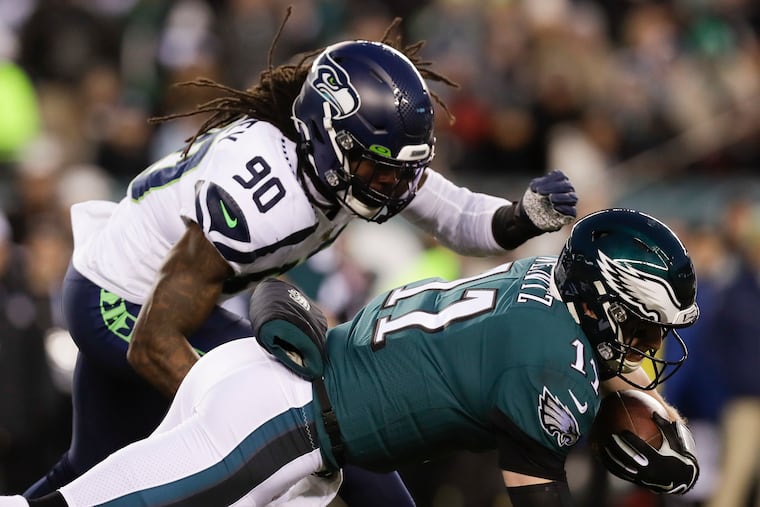Eagles should avoid Jadeveon Clowney this time around | Marcus Hayes
They should have snagged him last August, but his price tag and injury history should discourage them now.

Last year, Jadeveon Clowney cost the Seahawks two backup linebackers, a third-round pick, and just $8 million.
That’s a price the Eagles should have been willing to pay. Last year, Jadeveon Clowney, playing for his next contract, would have been motivated to make millions more. Last year, Jadeveon Clowney would have supplanted Derek Barnett at defensive end, and he would have been a massive upgrade.
And, of course, last year, if Jadeveon Clowney hadn’t been traded from the Texans to the Seahawks, he wouldn’t have knocked Carson Wentz out of their playoff game — and, by association, knocked the Eagles out of the playoffs.
Last year, the Eagles should have snagged Jadeveon Clowney.
This year, the Eagles should stay away from Jadeveon Clowney.
Chatter surrounding the Eagles’ interest in Clowney, the biggest free agent left on the market, seems to be increasing. There’s even an unverified report that the Eagles have already offered Clowney a contract.
This year, Clowney, 27, will likely cost $15 million to $20 million for even a single year. Nobody has offered him the multiyear deal at around $20 million per season he wants, but he probably won’t sign a one-year deal, so his inconsistencies will manifest long-term, in an already unstable locker room, on a flawed and aging roster.
As poorly as Barnett played last season, Clowney won’t add enough to warrant his price this season.
The Eagles have committed more than $150 million to their top five defensive linemen against their salary cap in the next two seasons. They have space left under this year’s cap, but they can roll over unused cap space in 2020, and, as things stand they’re going to be far over the cap in 2021. Clowney’s not worth the financial headache, or the other assorted aches that always accompany him.
He’d be coming off surgery to repair core and hip injuries, the latest in a litany of ailments almost too numerous to believe.
This off-season’s procedure was actually Clowney’s second surgery to repair a core injury; he had his first in June 2014, just weeks after the Texans drafted him No. 1 overall.
He then had two knee surgeries as a rookie, which cost him 12 games. He sprained his ankle, back, and foot in 2015, the last of which cost him a playoff game. He missed the 2016 season finale, as well as the subsequent playoff game, with another knee injury, which also required surgery.
He needed yet another knee surgery after the 2017 season, the only season in which he played every game. He fought back problems again in 2018, which cost him another game. He then missed three games last year with his latest core muscle problem.
And you thought Carson Wentz was fragile.
There doesn’t seem to be any lingering bad feelings from Wentz or his teammates.
“That’s football. It was an unfortunate way to end the season for me personally, but I have respect for Jadeveon. He’s a heck of a player,” Wentz said last week. “I don’t think he had any ill will with that hit.”
On his Outside the Lane podcast Monday, right tackle Lane Johnson told former teammate Chris Long: “He’s like trying to block a running iguana on water, son.”
A three-legged iguana, maybe. A team source said Clowney’s injury history played a large role in the Eagles’ lack of interest in Clowney last year.
“We have to bet on our young players. We have to bet on our scouting,” general manager Howie Roseman said three days after Clowney was traded on Aug. 31. “We have to bet on our coaching, and we are going to take that bet at that position."
The Eagles mainly bet on Barnett. Among edge rushers who played at least 200 snaps, Barnett ranked 93rd, according to Pro Football Focus. Clowney ranked 10th. The Eagles lost that bet.
Now they’ve doubled down. Not only will Barnett be back this season, but the Eagles also picked up his fifth-year option, so he’ll probably be an Eagle in 2021, too. He missed 14 games the last two seasons, including playoffs, but he’s cheap — $2.2 million this season and an escapeable $9.4 million in 2021 — and he’s Roseman’s draft pick.
But Barnett’s not the main reason the Eagles don’t need Clowney this season. Defensive tackles Malik Jackson and Javon Hargrave are.
Jackson signed a three-year, $30 million free-agent contract in 2019. Hargrave signed a three-year, $39 million deal in March.
They’ll play with Fletcher Cox, who has earned five consecutive Pro Bowl berths, but they won’t always play next to him. That threesome will see time together, along with defensive end Brandon Graham, which means Barnett will likely see a reduction from the 47.8 snaps he averaged in the 21 games (counting playoffs) since he became a starter in 2018.
Jackson and Hargrave won’t be the only reasons. The Eagles used fourth-round picks on Josh Sweat in 2018 and Shareef Miller in 2019. And they adore 2018 rookie free agent Joe Ostman, the baker’s son with the Wolverine body.
Ostman lost his 2019 season to a knee injury, but that happened about a month before Clowney was traded to the Seahawks, so Roseman wasn’t betting on Ostman when he explained why he didn’t acquire Clowney last year.
Roseman was talking about Miller and Sweat, and, of course, Barnett. That group underperformed so badly that the Eagles traded a 2021 fourth-round pick to the Browns at the deadline in late October for Genard Avery, whose rights they retain through 2021.
They hoped to find one diamond in all of that ore, and that was their mistake then.
Signing Clowney would be an even bigger mistake now.